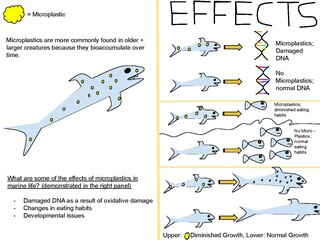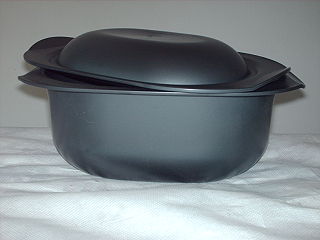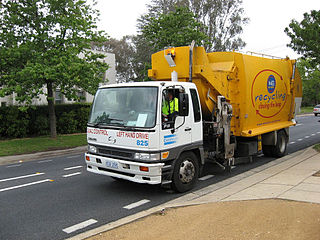Related Research Articles

BASF SE, an acronym for a its original name Badische Anilin- und Sodafabrik, is a European multinational company and the largest chemical producer in the world. Its headquarters are located in Ludwigshafen, Germany.

The Dow Chemical Company, officially Dow Inc., is an American multinational corporation headquartered in Midland, Michigan, United States. The company is among the three largest chemical producers in the world.
Eastman Chemical Company is an American company primarily involved in the chemical industry. Once a subsidiary of Kodak, today it is an independent global specialty materials company that produces a broad range of advanced materials, chemicals and fibers for everyday purposes. Founded in 1920 and based in Kingsport, Tennessee, the company now has more than 50 manufacturing sites worldwide and employs approximately 14,000 people.

Plastic recycling is the processing of plastic waste into other products. Recycling can reduce dependence on landfill, conserve resources and protect the environment from plastic pollution and greenhouse gas emissions. Recycling rates lag those of other recoverable materials, such as aluminium, glass and paper. Through 2015, the world produced some 6.3 billion tonnes of plastic waste, only 9% of which has been recycled, and only ~1% has been recycled more than once. Additionally, 12% was incinerated and the remaining 79% sent to landfill or to the environment including the ocean.

Low-density polyethylene (LDPE) is a thermoplastic made from the monomer ethylene. It was the first grade of polyethylene, produced in 1933 by Imperial Chemical Industries (ICI) using a high pressure process via free radical polymerization. Its manufacture employs the same method today. The EPA estimates 5.7% of LDPE is recycled in the United States. Despite competition from more modern polymers, LDPE continues to be an important plastic grade. In 2013 the worldwide LDPE market reached a volume of about US$33 billion.

Formosa Plastics Corporation is a Taiwanese plastics company based in Taiwan that primarily produces polyvinyl chloride (PVC) resins and other intermediate plastic products. It is the corporation around which influential businessman Wang Yung-ching formed the Formosa Plastics Group, and it remains central to the Group's petrochemical operations. The president of Formosa Plastics Corp. (FPC) is Jason Lin (林健男).

Ocean Conservancy is a nonprofit environmental advocacy group based in Washington, D.C., United States. For over 50 years, Ocean Conservancy seeks to promote healthy and diverse ocean ecosystems, prevent marine pollution, climate change and advocates against practices that threaten oceanic and human life.

In 2015, 43.5% of the United Kingdom's municipal waste was recycled, composted or broken down by anaerobic digestion. The majority of recycling undertaken in the United Kingdom is done by statutory authorities, although commercial and industrial waste is chiefly processed by private companies. Local Authorities are responsible for the collection of municipal waste and operate contracts which are usually kerbside collection schemes. The Household Waste Recycling Act 2003 required local authorities in England to provide every household with a separate collection of at least two types of recyclable materials by 2010. Recycling policy is devolved to the administrations of Scotland, Northern Ireland and Wales who set their own targets, but all statistics are reported to Eurostat.
NatureWorks LLC is an international company that manufactures bioplastics—polymers derived entirely from plant resources—as an alternative to conventional plastic, which is made from petroleum. The commercial quality polymer is made from the carbon found in simple plant sugars such as corn starch to create a proprietary polylactic acid polymer (PLA) which is marketed under the brand name Ingeo. Headquartered in Plymouth, Minnesota, NatureWorks is jointly owned by Cargill and PTT Global Chemical, a Thai state-owned company.

Marine plastic pollution is a type of marine pollution by plastics, ranging in size from large original material such as bottles and bags, down to microplastics formed from the fragmentation of plastic material. Marine debris is mainly discarded human rubbish which floats on, or is suspended in the ocean. Eighty percent of marine debris is plastic. Microplastics and nanoplastics result from the breakdown or photodegradation of plastic waste in surface waters, rivers or oceans. Recently, scientists have uncovered nanoplastics in heavy snow, more specifically about 3,000 tons that cover Switzerland yearly.
ExxonMobil Corporation is an American multinational oil and gas corporation and the largest direct descendant of John D. Rockefeller's Standard Oil. The company, which took its present name in 1999 per the merger of Exxon and Mobil, is vertically integrated across the entire oil and gas industry, and within it is also a chemicals division which produces plastic, synthetic rubber, and other chemical products. ExxonMobil is headquartered in the Houston suburb of Spring, though officially incorporated in New Jersey.

Plastics are a wide range of synthetic or semi-synthetic materials that use polymers as a main ingredient. Their plasticity makes it possible for plastics to be moulded, extruded or pressed into solid objects of various shapes. This adaptability, plus a wide range of other properties, such as being lightweight, durable, flexible, and inexpensive to produce, has led to its widespread use. Plastics typically are made through human industrial systems. Most modern plastics are derived from fossil fuel-based chemicals like natural gas or petroleum; however, recent industrial methods use variants made from renewable materials, such as corn or cotton derivatives.
Recycling can be carried out on various raw materials. Recycling is an important part of creating more sustainable economies, reducing the cost and environmental impact of raw materials. Not all materials are easily recycled, and processing recyclable into the correct waste stream requires considerable energy. Some particular manufactured goods are not easily separated, unless specially process therefore have unique product-based recycling processes.
Products made from a variety of materials can be recycled using a number of processes.

Plastic pollution is the accumulation of plastic objects and particles in the Earth's environment that adversely affects humans, wildlife and their habitat. Plastics that act as pollutants are categorized by size into micro-, meso-, or macro debris. Plastics are inexpensive and durable, making them very adaptable for different uses; as a result, manufacturers choose to use plastic over other materials. However, the chemical structure of most plastics renders them resistant to many natural processes of degradation and as a result they are slow to degrade. Together, these two factors allow large volumes of plastic to enter the environment as mismanaged waste and for it to persist in the ecosystem.
There are various issues of waste management in Thailand, including excessive plastic use, industrial waste, among others.

The Gordon E. Moore Medal is an award given yearly by the Society of Chemical Industry to someone who has displayed early career success involving innovation in chemical industries. Success is judged in terms of both market impact and effects on quality of life of their work.

Plastic containers are containers made exclusively or partially of plastic. Plastic containers are ubiquitous either as single-use or reuseable/durable plastic cups, plastic bottles, plastic bags, foam food containers, Tupperware, plastic tubes, clamshells, cosmetic containers, up to intermediate bulk containers and various types of containers made of corrugated plastic. The entire packaging industry heavily depends on plastic containers or containers with some plastic content, besides paperboard and other materials. Food storage nowadays relies mainly on plastic food storage containers.

Recycling in Australia is a widespread, and comprehensive part of waste management in Australia, with 60% of all waste collected being recycled. Recycling is collected from households, commercial businesses, industries and construction. Despite its prominence, household recycling makes up only a small part (13%) of Australia's total recycling. It generally occurs through kerbside recycling collections such as the commingled recycling bin and food/garden organics recycling bin, drop-off and take-back programs, and various other schemes. Collection and management of household recycling typically falls to local councils, with private contractors collecting commercial, industrial and construction recycling. In addition to local council regulations, legislation and overarching policies are implemented and managed by the state and federal governments.

Multi-layered packaging are multilayer or composite materials using innovative technologies aimed to give barrier properties, strength and storage stability to food items, new materials as well as hazardous materials.
References
- 1 2 Sharma, Joe Brock, John Geddie, Saurabh (18 January 2021). "Big Oil's flagship plastic waste project sinks on the Ganges". Reuters.
- ↑ "About". Alliance To End Plastic Waste. Retrieved 3 July 2021.
- ↑ "Alliance To End Plastic Waste". endplasticwaste.org. Retrieved 2023-03-06.
- ↑ "Alliance to End Plastic Waste targets plastic in the environment". Recycling Today.
- ↑ "Inside Big Plastic's Faltering $1.5 Billion Global Cleanup Effort". Bloomberg.com. Retrieved 2023-02-22.
- 1 2 "Alliance to End Plastic Waste: Barely Credible" (PDF). planet-tracker.org/. August 2022.
- 1 2 "'It's a pipe dream': Green groups blast plastic makers' recycling push". www.msn.com.
- ↑ "The Plastic Industry Is Growing During COVID. Recycling? Not So Much". FRONTLINE.
- ↑ "U.S. Recycling Industry Is Struggling To Figure Out A Future Without China". NPR.org.
- ↑ Osborne, James (30 October 2020). "U.S. contribution to plastic waste crisis larger than previously understood". Houston Chronicle.
- ↑ "Ocean Stewards". Alliance to End Plastic Waste.